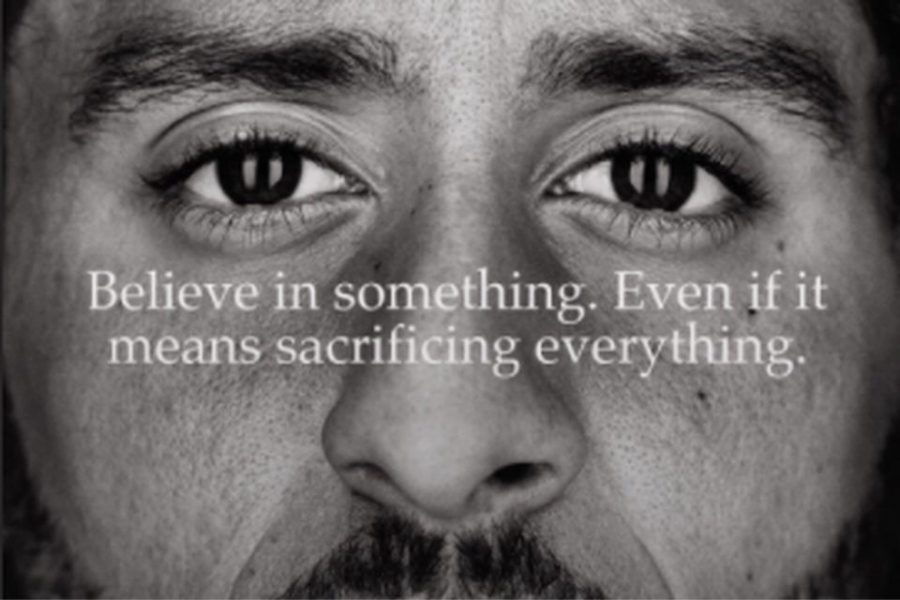Follow the Leader
Although Kaepernick’s Nike ad faced serious backlash, Nike still earned over 6 billion dollars.
In the 2010s, many media platforms began to “cancel” celebrities or famous athletes, creating a temporary trend that allowed people to jump on the bandwagon. Many times, these cancel trends quickly blow over, as many people have been able to easily recover from their torment.
One of the most infamous victims of cancel culture is Colin Kaepernick, an ex-quarterback for the San Francisco 49ers. In the later half of the ‘10s, Kaepernick and many other NFL football players began to kneel during the national anthem in protest of police brutality towards minorities and racial inequality in the United States. In 2018 in the midst of the controversy, Kaepernick became the face of Nike’s 30th anniversary “Just Do It” campaign.
Kaepernick received the short end of the stick, or at least initially. The ex-football player no longer competed in the NFL because of the controversy surrounding him, and many people deemed him “anti-American.” However, his recent shoe line collaboration with Nike has sold out. Although initially cancelled, Kaepernick is still successful.
On May 10, 2019, beauty blogger Tati Westbrook uploaded a 43-minute video to YouTube entitled “BYE SISTER,” poking fun at fellow beauty blogger James Charles’s catchphrase, “Hi sisters!” In the now deleted video, Westbrook exposed Charles for inappropriate behavior, including sexual harassment. The drama continued as James Charles released a follow up video entitled “TATI…” and later another one defending himself. Other YouTube influencers, including Shane Dawson and Jeffree Star, made comments and began to choose sides. Charles immediately faced backlash on Twitter and YouTube. In just three days, the then 19-year-old lost over 2.5 million subscribers on his channel.
People began to cancel the beauty vlogger and call him a predator; however, less than a month after Tati’s video release, Charles was able to gain his lost followers back after the release of a shady video that seemed to expose Tati, Jefferee Star and other YouTubers. Many people were quick to cancel Charles, yet many decided to side with the young vlogger after just one promising video. Cancel culture never has a clear good guy or bad guy. When Tati released her video, James Charles was the villain, but when Charles made a response video, Tati and Jeffree Star were suddenly in the wrong. People usually pick sides that produce the most controversy.
Many celebrities must be on their best behavior, as others are always watching. Sometimes past scandals or controversies can arise several years later. Singer Camila Cabello is a prime example.
On December 6, 2019, Camila Cabello dropped her new album Romance. With the release, many users on Twitter began to bring up an old Tumblr account from 2012 that Cabello owned when she was a teenager. The account featured several racist posts using profane and derogatory language. On December 18, the now 22-year-old issued an apology via Twitter for her past comments and said she has grown in the last eight years.
“When I was younger, I used language that I’m deeply ashamed of and will regret forever. I was uneducated and ignorant, and once I became aware of the history and weight and the true true meaning behind this horrible and hurtful language, I was deeply embarrassed I ever used it,” Cabello tweeted.
Many people think she was old enough to know her language was racist and continue to bash her, even calling her a racist or “clown.” Despite this scandal, Cabello has still been successful with her album release. Many people have decided to forgive Cabello or dropped the issue after a few days. The past can continue to burden a celebrity, but many fan bases are too loyal to ever leave their idols, no matter what they say or do.
Although many people online continue this practice of “canceling” celebrities, victims always seem to make it out on the other end alive. Unfortunately, the cancel trend seems to have no end in the near future. As social media continues to rise, instantaneous exposure will fuel cancel culture.

Christian is a senior here at St. Dominic. He is the secretary of the Ambassadors Program and involved in National Honors Society, Peer Ministry and Pro-Life...








